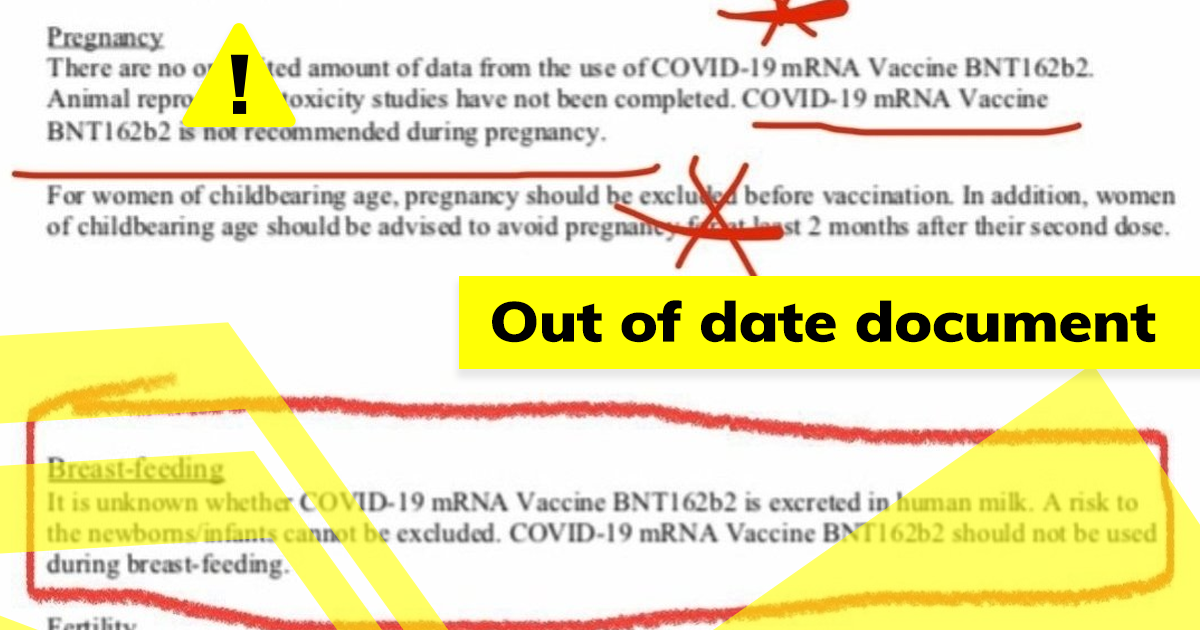‘Pfizer document’ doesn’t show company admitting vaccines unsafe in pregnancy

Claims that Pfizer had recently released documents stating that the Covid-19 vaccines were not recommended during pregnancy and breastfeeding have been shared thousands of times on Twitter.
The posts, which show an extract from an official-looking document stating that “COVID-19 mRNA Vaccine BNT162b2 [the Pfizer Covid-19 vaccine] is not recommended during pregnancy” and “it is unknown whether COVID-19 mRNA Vaccine BNT162b2 is excreted in human milk” therefore “a risk to the newborns/infants cannot be excluded”, have also appeared on Facebook.
‘Pfizer’ document isn’t new
This document, some people argued, was proof from Pfizer that the vaccines were unsafe for use during pregnancy and breastfeeding.
However, as Imperial College immunologist Dr Victoria Male pointed out on Twitter, the screenshotted document isn’t from Pfizer, and doesn’t reflect current understanding of the vaccine either.
The pages in question appear to have first been published online in December 2020 by the Medicines and Healthcare Products Regulatory Agency (MHRA), as part of a longer document titled “information for healthcare professionals”.
A spokesperson for the MHRA told Reuters that “this was our assessment at the time of approval for the vaccine”.
The spokesperson added: “Since then new data which has come to light (both non-clinical and post-authorisation ‘real world’ data) supports the updated advice on vaccinating those who are pregnant and breastfeeding.
“Over 104,000 pregnant people have received at least one dose of COVID-19 vaccine in England and Scotland and no concerns of the safety of the vaccines have been raised.”
Vaccines recommended during pregnancy and breastfeeding
False claims about the use of Covid-19 vaccines during pregnancy have proliferated during the pandemic, and we have written about them many times in the past.
According to the Royal College of Obstetricians and Gynaecologists (RCOG), current evidence suggests that pregnancy increases the risk of becoming severely unwell if you catch Covid-19. If this happens there is also an increased risk of complications to the pregnancy, such as the baby being delivered early.
As we have written before, pregnant women were excluded from the initial large-scale Covid-19 vaccine trials. There were 57 unintended pregnancies during the trials of the Moderna, Pfizer and Astrazeneca vaccines but this number was too small to show much about safety in pregnancy.
However, there have been a number of studies conducted worldwide into data sets on the outcomes when people were vaccinated while pregnant during the general roll-out, with the specific goal of identifying safety concerns either during pregnancy or after birth. No significant safety concerns have arisen as a result of these studies.
RCOG has said Covid-19 vaccines are “strongly recommended to breastfeeding women”, adding: “There is no plausible mechanism by which any vaccine ingredient could pass to your baby through breast milk.”
The MHRA’s latest version of its advice to healthcare professionals on the Pfizer Covid-19 vaccine says the vaccine should only be considered when the potential benefits outweigh any potential risks for the mother and foetus.
It still says: “It is unknown whether the COVID-19 mRNA Vaccine BNT162b2 is excreted in human milk.”
The NHS says: “It’s strongly recommended that you get vaccinated against COVID-19 if you’re pregnant.
“It’s preferable for you to have the Pfizer/BioNTech or Moderna vaccine. This is because they’ve been more widely used during pregnancy in other countries and no safety concerns have been identified.”
And the Joint Committee on Vaccination and Immunisation is reminding pregnant women to have their Covid-19 vaccines as soon as possible.


